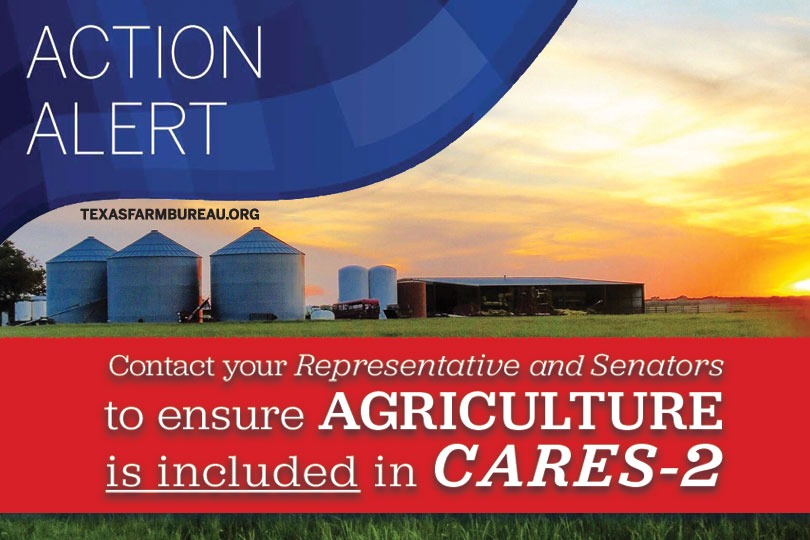By Jennifer Dorsett
Field Editor
The COVID-19 pandemic has dealt an enormous blow to Texas farmers and ranchers. Volatility and uncertainty in markets, combined with supply chain issues during the unprecedented national emergency, have negatively impacted all sectors of agriculture.
Congress is currently working on the second Coronavirus Aid, Relief, and Economic Security Act, also known as the CARES-2 Act. But the federal response to COVID-19 will require ongoing action to adequately address the needs of agriculture.
“Right now, we’re waiting to see how the funding in CARES-1 will be distributed, and while we’re appreciative of that bill, we know it’s not enough for all of American agriculture,” Texas Farm Bureau (TFB) National Legislative Director Laramie Adams said. “Farmers and ranchers are still struggling, and the food supply chain is still facing challenges getting goods to consumers.”
While legislation recently introduced in the U.S. House provides some additional assistance to farmers and ranchers, Adams said more needs to be done during negotiations to provide robust relief for farm and ranch families.
To ensure farmers and ranchers get the help they need, TFB is encouraging members to contact their lawmakers to ask that they support two bills by Rep. Austin Scott, HR 6611 and HR 6728, for the CARES-2 Act.
HR 6611 will provide an additional $50 billion to the U.S. Department of Agriculture (USDA) to support farmers and ranchers impacted by COVID-19.
The second bill introduced by Scott will raise the borrowing limit of the Commodity Credit Corporation (CCC) to $68 billion, which would effectively allow the borrowing limit to catch up to inflation since it was last adjusted in 1987.
TFB is also asking Congress to ensure adequate funding is available for all farmers and ranchers who have encountered losses due to COVID-19.
“We’re just asking that more funding be allocated to USDA to help agriculture,” Adams said. “We don’t want to see anyone go out of business because of this, but that’s what’s going to start happening if farmers and ranchers don’t get some relief.”
It’s impossible to fully predict the extent COVID-19 will have on agriculture, Adams noted, so it’s imperative Congress prepare for those scenarios and stand ready to assist farmers and ranchers.
“Everyone has been impacted by the pandemic,” he said. “We understand that there’s no one industry that’s remained untouched by COVID-19. But if there’s any sector that needs help, TFB firmly believes it should be the people who grow our food and fiber. Without them, we’re lost.”

